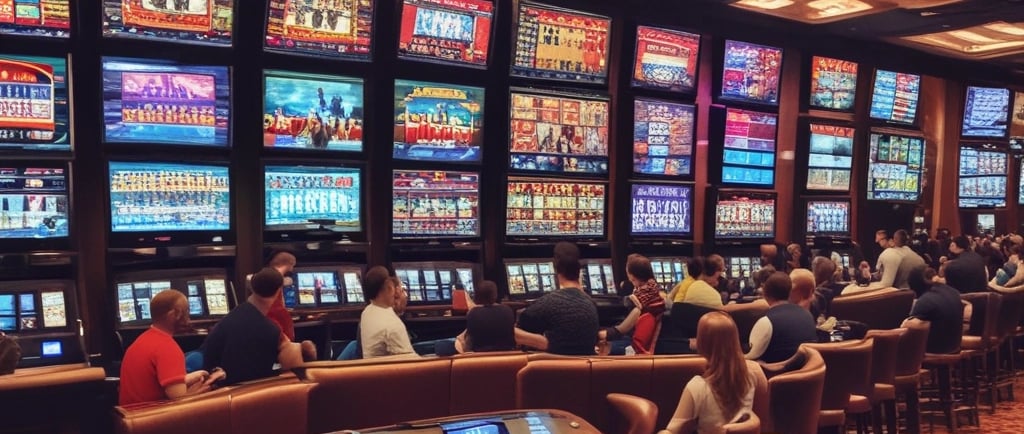Understanding Sports Betting: The Influence of Betting Odds on Vegas Odds
SPORTS
Glenn Spillman
11/16/20254 min read


The Basics of Sports Betting
Sports betting entails placing a wager on the outcome of a sporting event, with the primary goal of predicting the results accurately. Bettors can engage in various forms of betting, each offering unique opportunities and challenges. Understanding these fundamental concepts is essential for anyone looking to delve into the world of sports wagering.
One of the primary aspects of sports betting is the odds, which reflect the likelihood of a specific outcome occurring. Odds are typically displayed in several formats, with the most common being decimal, fractional, and American odds. These figures not only indicate the probability of a team winning or losing but also determine potential payouts. As a result, bettors need to grasp how odds function to make informed decisions when placing their wagers.
There are several types of bets that bettors can choose from, each with its distinct characteristics. The point spread is one popular option, involving a margin set by bookmakers to level the playing field between two competing teams. By betting against the spread, bettors can either support the favored team or back the underdog. Moneyline bets are another common form, where bettors wager on which team will win outright, without the impact of points. Additionally, totals, or over/under bets, allow individuals to predict whether the combined score of both teams will be over or under a certain number provided by the bookmakers.
Furthermore, understanding key terminology associated with sports betting is crucial for success. Terms such as vigorish, parlay, and teaser may appear daunting for newcomers but play significant roles in the betting landscape. By familiarizing themselves with these fundamental concepts, bettors can lay a solid foundation for their sports betting journey, preparing them for the more intricate discussions on odds and their nuances in subsequent sections.
How Odds Are Determined in Vegas
The process of determining betting odds in Las Vegas is a complex interplay of various factors. Bookmakers utilize a range of statistical data, player performance metrics, and market trends to set their lines. Team statistics, including previous match outcomes, overall season performance, and head-to-head records, are critical in assessing the relative strength and competitiveness of the teams involved in a matchup.
Another significant aspect is player performance. A sportsbook carefully examines individual player statistics, injury reports, and recent form, as these elements can dramatically influence the outcome of a game. For instance, the absence of a star player due to injury can lead to a shift in odds, as it may impact the team's chances of winning. This vigilance extends to monitoring player conditioning and any external factors that may affect performance, such as travel or weather conditions.
The sportsbooks also take into account public perception and betting behavior. The influence of the betting public can sway odds significantly; for example, if a large number of bets come in on one side, bookmakers might adjust the odds to encourage balanced betting and reduce potential losses. This dynamic nature of odds setting means that they are not static and can change rapidly in response to the flow of money in the market.
Furthermore, the advent of algorithms and advanced data analysis has refined this process. Many bookmakers now employ sophisticated technology to analyze vast amounts of data and predict outcomes more accurately. Such systems allow for real-time adjustments to the odds based on emerging information, ensuring that sportsbooks remain profitable while minimizing their exposure to risk.
Factors Influencing Odds Changes Leading to Game Time
Betting odds are a crucial element of the sports wagering framework, and their fluctuations prior to a game can significantly impact the betting landscape on platforms including traditional sportsbooks and online betting sites. One primary factor that influences these changes is team rosters, particularly concerning injuries or trades. When a key player suffers an injury or is replaced, it can alter the perceived strength of the team, which results in a subsequent adjustment of the odds. This dynamic requires constant monitoring by sportsbooks to reflect the most accurate probabilities of game outcomes.
Another essential factor in shifting betting odds is public betting trends. When a significant number of bettors gravitate towards one team, sportsbooks may modify the odds to balance the action and mitigate their exposure to risk. This is particularly evident during popular matchups or playoff games, where public sentiment can heavily influence the odds. Sharp money, which refers to bets placed by seasoned and knowledgeable bettors, can also sway the lines. When sportsbooks recognize significant wagers from these individuals, they may adjust the odds to account for the betting value that sharp players anticipate.
External factors such as weather conditions can also play an influential role in odds changes leading up to game time. For instance, rain or snow could impact a team's performance or change the style of play, prompting sportsbooks to re-evaluate their betting lines. Additionally, historical matchups between teams can inform odds adjustments. If Team A historically performs well against Team B, oddsmakers might adjust odds accordingly, transforming statistical histories into actionable insights.
By incorporating these varied factors, sportsbooks strive to create a betting environment that is not only competitive but also secure, ensuring they maintain profitability while accommodating the betting dynamics present within the market.
The Impact of Betting Trends on Vegas Odds
Betting trends play a significant role in shaping the landscape of sports betting, particularly concerning Vegas odds. These trends reflect the collective behavior and sentiments of bettors and can greatly influence the odds offered by bookmakers. As public perception shifts based on various factors—such as team performance, injuries, or even social media narratives—Vegas odds tend to adjust accordingly. This psychological aspect of betting underscores how worth noting public sentiment can sway the odds significantly, often leading to opportunities for both seasoned and inexperienced bettors.
When a large volume of bets is placed on a specific team or outcome, bookmakers adjust their odds to mitigate risk. Consequently, if the public heavily favors one side, the odds on that team may shorten to attract more bets on the opposite side. This manipulation is key to how Vegas odds are not merely static numbers but rather dynamic reflections of public behavior and media influence. Understanding this correlation can be vital for bettors aiming to make informed decisions.
Experienced bettors often analyze betting trends to identify potential value in the odds. They recognize that Betting lines shift frequently, often in response to sudden surges in public interest or media hype. Consequently, they employ various strategies, such as contrarian betting or seeking out discrepancies between their assessments and the available odds. This analytical approach allows them to capitalize on mispriced lines, while casual bettors may find themselves following the crowd, leading to less favorable outcomes in their wagering endeavors.
As betting trends continue to evolve, understanding the nuances of how these trends impact Vegas odds will be crucial for bettors across all experience levels. Monitoring public sentiment, analyzing line movements, and remaining aware of the broader betting landscape can provide valuable insights that lead to smarter betting choices.
Connect
Stay in touch with Ravens Nest Media Group
Call
contact@ravensnestmediagroup.com
916-420-0697
© 2025. All rights reserved.
